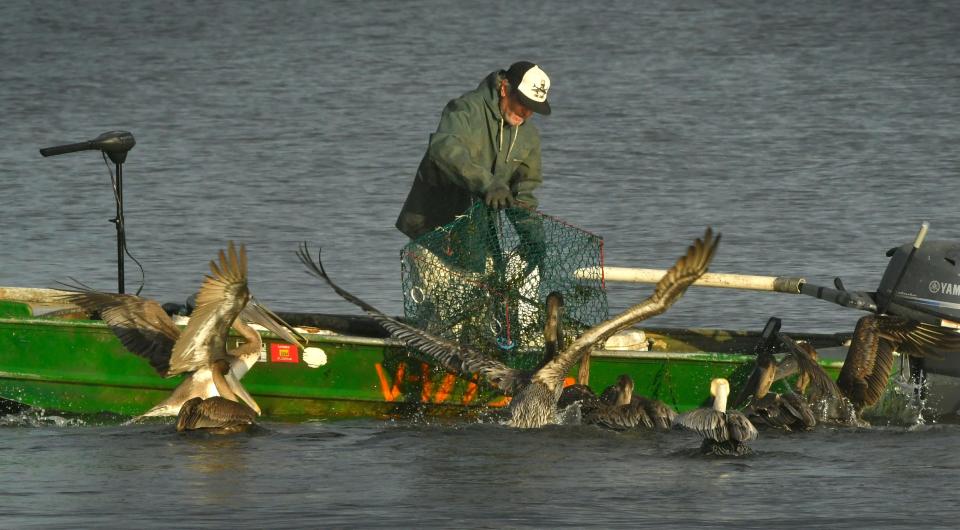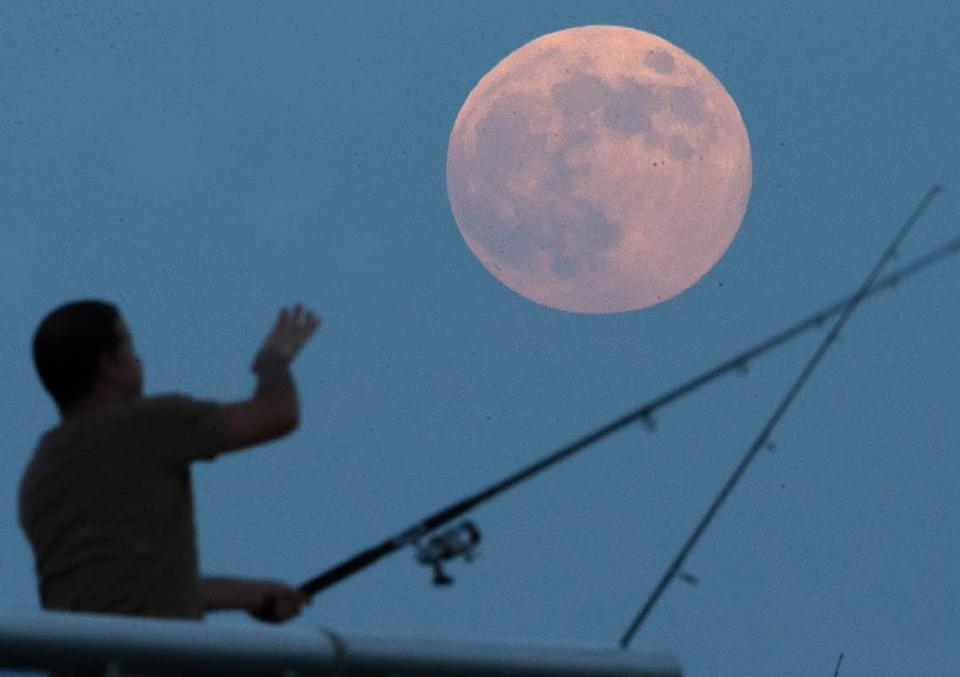Would Florida Amendment 2 ensure fishing and hunting rights, or lead to 'overkill?'
Hunters and anglers are eager to ink "yes" for a proposed amendment that would add the right to hunt and fish to Florida’s constitution. But opponents worry Amendment 2 might be legal overkill that could lead to a wild west of indiscriminate killing of wildlife — fears the initiative's supporters say are way overblown.
"We think this is one of the most important conservation topics we'll be able to vote on for a long time," said Travis Thompson, executive director of the nonprofit All Florida and a duck-hunting guide in Winter Haven, Florida. "We see attacks on hunting and fishing all the time."
Amendment 2 began as House Joint Resolution 1157, which passed last year, putting the measure on this year's Nov. 5 ballot. It would take at least 60% of the vote to pass and the Governor couldn't veto it.
The amendment declares, "Fishing, hunting, and the taking of fish and wildlife, including by the use of traditional methods, shall be preserved forever as a public right and preferred means of responsibly managing and controlling fish and wildlife." It also says the amendment doesn't limit the Fish and Wildlife Conservation Commission's authority to manage species.
Amendment 2's advocates assert the measure is needed to stave off any future efforts to criminalize fishing and hunting. But its opponents fear making hunting and fishing the "preferred means" of wildlife population control, rather than more humane or less-lethal approaches such as birth control, could lead to overkill hunting and fishing. And including "traditional methods," they add, could eventually allow nets that entangle fish by the gills and other currently banned fishing and hunting tactics.
Manatee population control? Brevard County Commissioner argues Florida should kill manatees to save them

Twenty-three states have similar measures to protect hunting and fishing, Thompson notes.
So he and others supporting Amendment 2 say they're just trying to keep the status quo. They fear what's happened in other states such as Oregon, where signatures mount to get a measure on this year's ballot to make certain hunting and fishing illegal under animal cruelty laws. A similar earlier effort in the state failed.
Some are watching with a wary eye, worried the amendment might become a "Trojan Horse" to kill wildlife at will.
An 'end run' for bear hunters?
Despite assurances from Amendment 2 advocates, opponents fear that bear hunters and others will try to use the measure as an end-run around existing state hunting and fishing rules, such as the 1994 gill-net ban, which disallowed a long tradition of using nets that entangle fish by the gills.
"I do think this is somewhat related to the bear hunt," said Macie Codina, a Tallahassee lawyer who coauthored — with Florida State University law student Savannah Sherman — a recent article about the amendment for The Florida Bar Journal.
Hunting pressure already appears poised to mount on the Florida black bear. This year, the Florida Legislature passed a bill to allow property owners to shoot and kill bears without a permit or authorization if they "reasonably believed" they needed to to avoid imminent threat of death or serious bodily injury to themselves, others or a pet, "or substantial damage to a dwelling."
Previous coverage: Florida's 'Self Defense' against bears bill passes another hurdle
In 2020, Florida strengthened penalties for poaching bears, over concerns that they were being killed for their gallbladders. The most recent bear hunt happened in October 2015 but has been closed since that time. Current estimates put Florida's bear population at about 4,000.
Could hunters shoot on others' private property?
Amendment 2 opponents warn it would allow hunters to shoot game on others' private land. That's among concerns outlined on Noto2.org, a political committee based in DeBary. Advocates say that's absurd because Amendment 2 wouldn't affect laws against trespassing. But the critics of the measure say the devil is in the details of how it would play out in the real world, in terms of enforcement, or lack thereof.
A recent article in the Florida Bar Journal weighed in on the issue. In their article, Codina and Savannah Sherman lamented that Amendment 2 would "place hunting and fishing ahead of other, non-lethal means for managing Florida’s wildlife ... and make authorizing a hunt of these animals easier and quicker, potentially even before other science-backed measures are implemented for decreasing human-animal interactions."
"Using hunting and fishing as the first-rung approach for managing wildlife could have a catastrophic effect on wildlife populations throughout the state," their writeup says, "and such a drastic change would only require 60% of votes to be enacted."
While they acknowledge hunting and fishing are "essential parts of the history and culture" in Florida, Codina and Sherman found "little evidence that any such a threat will occur" to the state's hunting and fishing rights. "The only cited instance of this is a failed ballot initiative that sought to outlaw hunting, amongst several other practices, in Oregon."
Supporters of the amendment, including Sen. Jim Boyd, R-Bradenton, point to Oregon's failed ballot initiative as evidence of increased threats to fishing and hunting rights. Oregon's 2020 initiative would have changed state law to include currently lawful acts, such as hunting, fishing and slaughter of livestock, as punishable under the state’s animal cruelty laws. But the measure never got enough signatures to get on the ballot.
Although the Oregon initiative failed, its advocates haven't given up and are on pace with enough monthly signatures likely to land it on the ballot this year, said Luke Hilgemann, the executive director of The International Order of T. Roosevelt. His Arizona-based non-profit hunting advocacy group lobbied for the Florida amendment as a top priority in their national fight.
"We believe that these rights deserve to be forever protected," Hilgemann said. "We're really excited to have this on the ballot down there in Florida this November."
Katrina Shadix, executive director of the nonprofit Bear Warriors United, sees Florida's initiative as a backdoor bear hunt. "Amendment 2 was intentionally written to be vague, deceptive and have loopholes in it big enough to drive a Mack truck through," Shadix wrote in a Facebook post. "Floridians already have the right to hunt and fish and that right is given by the FWC Florida Fish and Wildlife Conservation Commission, which was created in 1999."
Fear of FWC chipping away at hunting, fishing rights
But that's what hunters and fishers fear — that FWC will chip away at those rights, basing wildlife management on emotion, even when the science says hunting and fishing might be the best ways to foster sustainable populations.
But some conservations fear the amendment might be used to try to trump the 1994 gill-net ban, given the amendments use of the term, "including by the use of traditional methods."
What's more traditional in Florida than the use of nets that entangle fish by the gills — a former mainstay method of mullet fishing?
But Martha Guyas, southeast fisheries policy director for the American Sportfishing Association, highly doubts a return of gill nets in Florida. Her group lobbied to get Amendment 2 on the ballot. "I think people are reading into this too much, that it would allow a bunch of gill nets," Guyas said. "It's my understanding that that would not be allowed here."
While Bob Zales, executive director of the Southeast Fisheries Association, Inc., a commercial fishing trade group, says he wants to learn more about Amendment 2, but he doesn't have a problem with what he's heard so far, "as long as it doesn't specify one particular sector, commercial or recreational."
Laurilee Thompson, owner of Dixie Crossroads Seafood Restaurant in Titusville, who grew up commercial fishing, says she wouldn't be too sad if the amendment did wind up enabling some degree of commercial gill netting back in the Indian River Lagoon. "There's not that many of them," Thompson said of commercial fishermen. "They helped control the hardhead catfish population that's out of control."
For now, some conservation groups remain unsure what exactly it might mean. Sierra Club has yet to take an official position on Amendment 2, said Dave Cullen, a lobbyist for the nonprofit, mostly because the group has been focused on other high-priority environmental policies.
Supporters of Amendment 2 are reluctant to specify which species they have in mind to hunt and fish as "preferred means" of managing them, only that the data, not emotions, should drive those decisions.
"It would apply to whatever the science drives," Travis Thompson said. "If a billion cardinals invade Florida, why wouldn't we consider hunters?" If you want an animal to exist long-term, you assign a value to it," he added. "If you don't hunt or fish, it should be important to you because it's going to keep wild Florida wild."
Here's what Florida Amendment 2 says
RIGHT TO FISH AND HUNT — Fishing, hunting, and the taking of fish and wildlife, including by the use of traditional methods, shall be preserved forever as a public right and preferred means of responsibly managing and controlling fish and wildlife. This section does not limit the authority granted to the Fish and Wildlife Conservation Commission under Section 9 of Article IV.

Jim Waymer is an environment reporter at FLORIDA TODAY. Contact Waymer at 321-261-5903 or jwaymer@floridatoday.com. Or find him on X: @JWayEnviro
This article originally appeared on Florida Today: Florida hunting, fishing rights up to voters in November election

